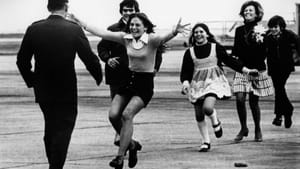Stay in the Loop
BSR publishes on a weekly schedule, with an email newsletter every Wednesday and Thursday morning. There’s no paywall, and subscribing is always free.
What we had, and what we’re losing
Pulitzer photos at National Constitution Center

In this age of cable news and pervasive video, it’s understandable that people who grew up lately may not comprehend the potential power of a single still photograph. It must seem inconceivable how a single moment frozen in time could move a whole nation and become an indelible, iconic part of that nation’s history.
The National Constitution Center has taken it upon itself to remind us of the power of the picture with its current exhibit of Pulitzer Prize-winning photos. It’s a potent reminder, indeed.
The exhibit’s photos span seven decades, from the early 1940’s through last year. The vast majority originally appeared in newspapers, although many of the more iconic images from the World War II and Vietnam eras appeared in now-departed publications like Life and Look, once-immensely popular picture magazines that ultimately lost their audiences to TV. Many of the images, such as the Marines raising the flag on Iwo Jima in 1945 and the Kent State shootings of 1970, have become indelible parts of their generations’ collective history and memory.
New settings, same theme
The Pulitzer Prize for photography is awarded in several categories, such as breaking news and features, and the winner usually captures a striking moment of human tragedy or human courage. Sadly, when we compare photos of this decade with those of the ’40s or ’60s, we see that the horrors of war and the depths of human struggle or suffering— or the power of human courage or dignity in the face of adversity— haven’t changed over the years.
The images from each decade are uniformly powerful and riveting. Only the settings change.
Some of the recent photos— such as the shot of the fiery World Trade Center on 9/11, or images of a humbled Bill Clinton during his impeachment— should be familiar. But many more will be new to most people, as they were to me. The reason, sadly, is that the newspapers in which these photos appear are themselves disappearing, and the magazines that would re-disseminate the images to a truly mass audience are long gone.
As print media fade
Thanks to cable TV and the Internet, fewer and fewer people actually see the photos that win the Pulitzer, even though today’s prizewinners are as powerful and moving as any in earlier years. Gone are the days when virtually the whole nation would see images captured by Associated Press photographers and printed in AP member papers across the country.
And that’s a shame. Still photography, particularly of historic moments, permits— in fact, demands— a level of absorption and contemplation that can make it a shared cultural memory. That shared cultural memory can help to mold the character and identity of a nation, creating a touchstone that builds a unity and connection between the individuals of a society.
It’s heartening that photographers are still out there recording these images even today. But it’s discouraging that the results of that labor are seen by fewer people as each year passes and the print media further diminish and fade.
The Constitution Center has done us all an invaluable service by assembling this collection. Do yourself a favor and expose yourself to this power of these photographs. They will evoke and enhance memories of the times you’ve lived through. They will draw tears and gasps of horror, as wells as smiles of amusement. They could change the way you look at the world.♦
To read a response, click here.
The National Constitution Center has taken it upon itself to remind us of the power of the picture with its current exhibit of Pulitzer Prize-winning photos. It’s a potent reminder, indeed.
The exhibit’s photos span seven decades, from the early 1940’s through last year. The vast majority originally appeared in newspapers, although many of the more iconic images from the World War II and Vietnam eras appeared in now-departed publications like Life and Look, once-immensely popular picture magazines that ultimately lost their audiences to TV. Many of the images, such as the Marines raising the flag on Iwo Jima in 1945 and the Kent State shootings of 1970, have become indelible parts of their generations’ collective history and memory.
New settings, same theme
The Pulitzer Prize for photography is awarded in several categories, such as breaking news and features, and the winner usually captures a striking moment of human tragedy or human courage. Sadly, when we compare photos of this decade with those of the ’40s or ’60s, we see that the horrors of war and the depths of human struggle or suffering— or the power of human courage or dignity in the face of adversity— haven’t changed over the years.
The images from each decade are uniformly powerful and riveting. Only the settings change.
Some of the recent photos— such as the shot of the fiery World Trade Center on 9/11, or images of a humbled Bill Clinton during his impeachment— should be familiar. But many more will be new to most people, as they were to me. The reason, sadly, is that the newspapers in which these photos appear are themselves disappearing, and the magazines that would re-disseminate the images to a truly mass audience are long gone.
As print media fade
Thanks to cable TV and the Internet, fewer and fewer people actually see the photos that win the Pulitzer, even though today’s prizewinners are as powerful and moving as any in earlier years. Gone are the days when virtually the whole nation would see images captured by Associated Press photographers and printed in AP member papers across the country.
And that’s a shame. Still photography, particularly of historic moments, permits— in fact, demands— a level of absorption and contemplation that can make it a shared cultural memory. That shared cultural memory can help to mold the character and identity of a nation, creating a touchstone that builds a unity and connection between the individuals of a society.
It’s heartening that photographers are still out there recording these images even today. But it’s discouraging that the results of that labor are seen by fewer people as each year passes and the print media further diminish and fade.
The Constitution Center has done us all an invaluable service by assembling this collection. Do yourself a favor and expose yourself to this power of these photographs. They will evoke and enhance memories of the times you’ve lived through. They will draw tears and gasps of horror, as wells as smiles of amusement. They could change the way you look at the world.♦
To read a response, click here.
What, When, Where
“Capture the Moment: Pulitzer Prize Photographs.†Through December 31, 2013 at National Constitution Center, 525 Arch St. (at Sixth). (215) 409-6600 or constitutioncenter.org.
Sign up for our newsletter
All of the week's new articles, all in one place. Sign up for the free weekly BSR newsletters, and don't miss a conversation.
 Gary L. Day
Gary L. Day